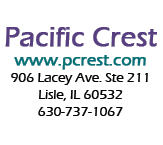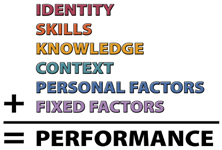|

       

 |
 |
|
The
content below is taken from Foundations of
Learning, 4th Edition. While the text was
written for students, the Performance Model is based
upon the Theory of Performance in the Faculty
Guidebook. This powerful model of performance is
of great utility for anyone seeking a way to
understand and improve performance. |
 
For a moment, think of all the things
you know how to do well. Now, think about how you
went from being a beginner to an accomplished
performer in these areas. You integrated skills and
knowledge to produce a valuable result. For example,
if you were asked to design a logo for the student
newspaper, you integrated multiple factors to
perform well as an artist, even if you were not
aware of them.
A group of educators from all over
the country have outlined the factors that make up a
theory of performance. This Performance Model
consists of: identity, skills, knowledge, context,
personal factors, and fixed factors. You have some
control over all of these, with the exception of
fixed factors. Your development and growth in the
five remaining areas will continue throughout your
life. Knowing that you have this control should help
give you the confidence you need to improve your
performance.
|
Components
that Interact to Establish Level of
Performance |
|
Identity
|
As individuals mature in a discipline, they
take on the shared identity of the
professional community while elevating their
own uniqueness. For a learner to perform
well, he or she must have a strong identity
as a member of a learning community. A
student demonstrates identity as a learner
when engaging in learning activities, such
as attending classes and studying. A student
who is majoring in psychology begins to
demonstrate identity within that field by
using the terminology of psychology. |
|
Skills
|
Skills describe specific actions that are
used by individuals, groups, or
organizations in multiple types of
performances. Within education, the focus is
on those skills that are transferable across
contexts and allow individuals to improve
their mastery of subject matter. These are
known as learning skills. Learners
who perform well work to increase their
mastery of learning skills. |
|
Knowledge
|
Knowledge involves facts, information,
concepts, theories, or principles acquired
by a person or group through experience or
education. You are learning about the
Performance Model right now and are adding
to your knowledge with every word you read.
|
|
Context
|
This component includes variables associated
with the situation in which the individual
or organization performs. Each time you
perform as a learner, you do so within a
specific context, which includes a number of
variables. For example, your performance in
this course has, as its context, the way you
meet (in a classroom? online?), how often
you meet as a class, the length of the term
(a full semester? an intensive summer
course?), and so on. Chapter 6 deals with
context of performance in depth. |
|
Personal Factors
|
This component includes variables associated
with the personal situation of an
individual. Your performance as a student
depends a great deal upon your personal
factors and the life situation you are in.
This can be a significant challenge. To use
a simple example, how well are you able to
study if youíre tired because you worked
late last night? Because personal factors
can present a significant challenge to
performing well, Chapter 7 deals with
addressing personal obstacles. |
|
Fixed Factors
|
This component includes variables unique to
an individual that cannot be altered. This
is the only aspect of performance that
cannot be altered and includes items such as
the first language you learned,
color-blindness, etc. While your performance
as a learner is certainly affected by fixed
factors, it is a mistake to assume that your
performance is constrained by these factors. |
In order to
appreciate how these different components affect
performance, we need to identify and isolate a
performance. Let's meet Jennifer, a first-year
college student, who is striving to improve her
performance as a student, in order to meet her
goals. |
|
| |

Jennifer is an eighteen-year-old first-year
student who plans to major in journalism. Her
goal is to become fluent in Spanish and work
as a journalist on a Spanish-language
publication.
Her aunt is a photojournalist who works for
travel magazines, and she inspired Jenn to do
a lot of writing in high school. Jenn worked
on the yearbook during her junior and senior
years and won a few writing contests along the
way. Although she did well in high school,
Jenn is a bit nervous about moving from a
small high school to a large college.
|
|
| |
|
The table below details
the components of Jennifer's performance in pursuit
of her goal:
|
Jenniferís Identity
|
Jenn has decided to become a reporter for
the student newspaper, so that she can begin
to learn what journalists do on a day-to-day
basis. She is also looking forward to the
workshops journalists from local papers give
for the college newspaper staff every month.
When she has established a comfortable
schedule, Jenn would like to volunteer at a
local Spanish-language newspaper written by
middle and high school students, La Voz
Latina (The Latin Voice). |
|
Jenniferís Learning Skills
|
Although Jennifer has studied Spanish for
many years, she has not lived near to any
large community of Spanish speakers. Her
perceptions of individual cultures come from
reading and the few Spanish speaking friends
she has, mainly from Mexico. Now that Jenn
has joined the Spanish-language lunch group
on campus, she can meet students from all
over: Spain, Nicaragua, Bolivia, Argentina,
and Puerto Rico. She has begun to observe
and appreciate the cultural differences
among these students, including the use of
idioms, the sense of personal space, and
general world views. Jenn notes down her
perceptions once a week, and checks them
against the next weekís interactions. |
|
Jenniferís Knowledge
|
Jennifer now realizes that becoming a
successful journalist means that she has a
good deal to learn about the cultures,
journalistic practices, history, and
contemporary issues of the Spanish-speaking
world. She is enrolled in a class on Current
Issues in Latin America, and the instructor
has an assignment on reading Latin American
newspapers, either in Spanish or in English.
Jenn is putting her new knowledge of current
affairs to good use with her
Spanish-language lunch group; the lunch
group is always happy to share their
opinions on these issues. |
|
Jenniferís Context
|
When Jenn does her newspaper assignment for
class, she also tries to analyze the
differences in writing style and use of
sources between an American and a Latin
American newspaper. This is more challenging
than she thought it would be, but it
strengthens her plan to work on a
Spanish-language newspaper here in town.
Jenn is now more aware of the different
contexts she has worked in as journalist:
the school yearbook and the college
newspaper. Working on a local paper seems to
be the next step, and then, maybe, writing
articles in Spanish. |
|
Jenniferís Personal Factors
|
Jenn has a good roommate, but she still
finds it hard to study Spanish at home
because their space is so small. She often
goes to the library or the language lab.
Although she worked and saved money over the
summer, Jenn is considering getting a
part-time job during the semester. She is
debating whether a better budget or a job
would be the smartest way to have a little
extra money and still succeed at her
academic goals. |
|
Jenniferís Fixed
Factors
|
As a native English speaker, Jenn will
always have that as her language base. She
may always have a bit of an American accent
in Spanish. However, Jenn has a good ear for
languages, and that has helped her Spanish
pronunciation. She does not have a good
sense of rhythm, though. She has realized
she will probably never be a world-class
Latin dancer, though going to dances will be
part of fitting into Latino culture.
|
If your performance
as a student is comprised of these components,
then it makes sense that learning to control,
develop, and influence these components will
help you improve your performance and be a more
successful student.
Foundations of
Learning is specifically designed to help
you do this by:
1) providing
information and knowledge you need in
order to perform as a learner
2) giving you a
solid foundation for identifying yourself
as a college student and learner
3) including
activities and assignments focused upon
improving your learning skills
4) containing
information about your new context, as a
college student
5) introducing ways
to help you deal with your personal factors.
|
| |
|
|
|
|
|
|
|
